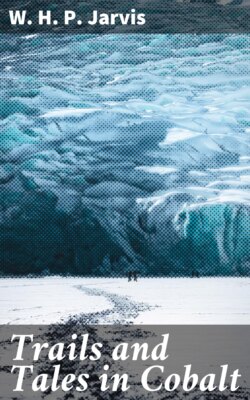Читать книгу Trails and Tales in Cobalt - W. H. P. Jarvis - Страница 4
На сайте Литреса книга снята с продажи.
ОглавлениеTrails and Tales in Cobalt
I.
Table of Contents
When I first met “Pard” he was on ground belonging to the Nipissing Mining Company, on the trail between Cross Lake and Cobalt Station. The fact that he was on this company’s property and in this locality bespoke him a stranger, for the ground in the vicinity had all been staked. Evidently he had just arrived in camp and was establishing himself that he might “get located.”
That he was a stranger was endorsed by the new tin pail which flashed back the sunlight in silvery splendor from the bundle of blankets which, with a tent, constituted the pack, engirthed by a pack-strap and lying where it had been flung on the ground. To this bundle there was a frying-pan attached, also new. With a small axe, such as prospectors use, he was clearing away the underbrush. There was nothing in his dress to denote the veteran, save that the hat he had was a well-worn Stetson, such as the tenderfoot is wont to affect, and the prospector and plainsman of the West ever chooses because it suits him best. The man’s movements were deliberate, but he never wasted an effort.
I was hot from my climb from the shores of Cross Lake, and I was generally tired. I sat down upon a log and began to size up the stranger, and made the summing-up above recorded. He never paid me the slightest attention, as is the code of his “brethren.”
“Making camp?” I asked.
“Yes,” he replied, without lifting his eyes.
“Trying to get located, I suppose, before you go and see if you can strike anything?”
“Yes,” he answered.
“Ever do any prospecting before?” I asked.
He lifted his eyes until they rested on me, just for a second or two; then his face was again hid behind the broad rim of his hat, and after the lapse of several more seconds he replied:
“Yes, but not in this country. The last place I prospected in was the Fort Steele country, looking for copper or lead. Been East visiting my folks, and thought I would like to come up here and see what was doing. I suppose the country is staked from ‘hell to breakfast’?”
“Yes,” I said, “pretty near, but you can’t chase these fellows out of Cobalt. They walk out every morning with a tomahawk and carrying a lunch, and expect to find a mine.”
I then told him of general conditions, and that I thought the most likely place of striking anything would be either to the north-west or the south-east of the main area, also that I had been away to the east that day in Lorrain township, and that there were very few prospecting in that district, and that I thought it held possibilities as great as any. I finally ventured the suggestion that he and I join forces and work as “partners” so far as camping and living together went.
I knew the class to which he belonged, and I liked his fellows. Schooled to generosity by the hardships of the mountain trails and the dangers of a frontier life, these men never seek to give their companions the greater burden on the trail, nor take to themselves the larger portion when the grub-pile runs low.
“Good-bye, Pard,” I said, as I left him, with his promise to think things over while he got acquainted; “I’ll see you on Monday.”
I continued my journey to Cobalt, feeling pleased that I had fallen in with a partner who was an experienced prospector. I could not guess that my new acquaintance—I did not yet know his name, but such knowledge was not necessary to an acquaintance between Western men—was one of the most celebrated trappers and hunters in the Kootenays, and likewise a raconteur of adventures such as the writer of short stories dearly loves to know. Of this I was ignorant, but what I had gained was sufficient to inspire new hope. Indeed, a change in method was necessary, for trying to prospect with Cobalt Station as a base was a poor business.
With these thoughts I had come to the collection of tents and shades which has since given place to the town of Cobalt. Eminently the place gave evidence of rush and excitement, and an atmosphere of a haste for wealth pervaded. It was not essentially different from towns set down in like conditions through like circumstances in the West, wherever Nature is overcome and yields a secret to the insatiate void in humankind. Here a rough board shack bears the sign “Cobalt Bloom and Soft Drinks.” “Cobalt Bloom” is the nearest approach to spirituous liquors openly sold in Cobalt. The product is not standardized, and public speculation is wild as to what constitutes its “dope.”
Surrounded by stumps, sticks, and stones, a tent, advertised by a big sign as the “Canadian Bank of Commerce,” stands on the hill just back of the Temiskaming and Northern Ontario Railway station. Facing it is a grocery store of rough lumber, and the camp stretches away in tents, log cabins, and rough board shacks, in the acme of disorder scattered over a topography rough and broken, asserting their existence in the face of endless stumps, logs, stones, and general rubbish.
The camp was engaged in cooking its evening meal, and the open fire or the little tin stove set outside the tent was the orthodox means. The frequent laughter, the coarse exclamations, and the loud oaths spoke of the restraints of civilization being absent. The gaiety was that of hearts without a care, the stimulation of the glory of autumnal air and weather, the reflection of the colorings of the forest on the surrounding hills.
